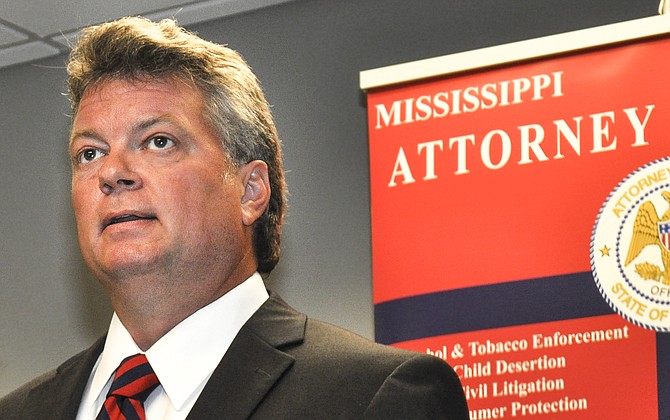Mississippi Attorney General Jim Hood believes grand juries are usually right when it comes to indicting people on criminal charges. Photo by Trip Burns.
Every person who is acquitted by a jury was indicted by a grand jury. Let that sink in, Dennis Sweet III, a prominent Jackson attorney, told an audience recently when talking about the effectiveness of the grand-jury process in Mississippi.
Mississippi College School of Law convened the panel in the wake of the deaths of 18-year-old Michael Brown in Ferguson and Eric Garner in Staten Island, N.Y., both at the hands of police officers. Those cases, along with several others around the country, sparked protests and calls for criminal indictments against the cops responsible in each.
In December, a New York City grand jury cleared Daniel Pantaleo, the officer who killed Garner by applying a chokehold. The previous month, a Missouri grand jury considering charges against Darren Wilson, the white officer who killed Brown after a confrontation on a St. Louis-area street, listened to witness testimony for months before delivering its decision not to indict Wilson.
The decision touched off protests around the nation and criticism about the objectivity of the elected St. Louis County prosecutor, Robert McCullough.
Attorney General Jim Hood, the state's highest-ranking law enforcement officer and a former district attorney for six counties in north Mississippi, denied that prosecutors can sway grand juries.
"Usually, grand juries get it right," Hood said. Matt Steffey, who teaches constitutional law at MC, joked that Hood is such a convincing litigator that he almost believed his suggestion about the near-infallibility of grand juries. However, in Mississippi, Steffey explained, the deck is stacked considerably against defendants.
For example, no court stenographer is present at grand jury proceedings in Mississippi unlike in many other states, including Missouri. The thousands of pages of transcripts that resulted from the Darren Wilson grand jury helped shed more light on the case, including questions that one witness may have lied under oath.
Defense attorneys are also barred from being present during a grand-jury probe in Mississippi. Steffey said the outcome of grand juries largely depend on the objectives of prosecutors, which is always to score a win. In other words, said Cynthia Speetjens, a former prosecutor who is now in private practice: "No prosecutor wants a loser case."
Data support the complaints of defense-minded counselors. A 2013 Bureau of Justice statistics report shows that at least in federal cases, indictments are usually all but guaranteed: Out of the 162,000 federal cases that U.S. Attorneys' offices prosecuted, only 11 failed to secure indictments. No similar review of state courts has occurred, but legal experts point to the study as proof of the legal maxim that grand juries would indict a ham sandwich.
The desire for victory can overwhelm even well-intentioned prosecutors. Outgoing U.S. Attorney General Eric Holder sent a memo in May 2010, reminding federal prosecutors that people who commit face similar charges for similar crimes should be treated similarly.
"Unwarranted disparities may result from disregard for this fundamental principle. They can also result, however, from a failure to analyze carefully and distinguish the specific facts and circumstances of each particular case. Indeed, equal justice depends on individualized justice, and smart law enforcement demands it," he wrote in what is now called "the Holder memo."
He continued: "Prosecutors must always be mindful of our duty to ensure that these decisions are made without unwarranted consideration of such factors as race, gender, ethnicity or sexual orientation."



Comments
Use the comment form below to begin a discussion about this content.
comments powered by Disqus